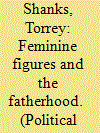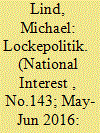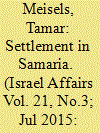| Srl | Item |
| 1 |
ID:
101842


|
|
|
|
|
| Publication |
2011.
|
| Summary/Abstract |
Traditionally neglected, Locke's First Treatise of Government has taken on new significance with feminist interpretations that recognize the importance of its sustained engagement with patriarchal power. Yet feminist interpreters, both critics and admirers alike, read Locke as a champion of the "man of reason," a figure seemingly immune to the influences of passions, imagination, and rhetoric. These interpreters wrongly overlook Locke's extended engagement with the power of rhetoric in the First Treatise, an engagement that troubles the clear opposition of masculine reason and its feminine exclusions. Taking Locke's rhetoric seriously, I argue, makes the First Treatise newly important for what it shows us about Locke's practice of political critique. In following the varied and novel effects of Locke's feminine figures, we find a practice of political critique that depends on a mutually constitutive relation between rhetoric and reason.
|
|
|
|
|
|
|
|
|
|
|
|
|
|
|
|
| 2 |
ID:
144647


|
|
|
|
|
| Summary/Abstract |
TODAY THE practice as well as the theory of foreign policy is divided between the traditions of liberalism and realism (or realpolitik). Ever since the UN Universal Declaration of Human Rights in 1948, international politics has been influenced by the discourse of “human rights,” rooted in the tradition of natural-rights philosophy that dates back to the seventeenth-century British philosopher John Locke. The idea of human or natural rights is commonly identified with the liberal tradition in foreign affairs. The liberal tradition, favoring international organization, international law, free trade and national self-determination, is often identified with Locke as well as with Adam Smith and Woodrow Wilson.
|
|
|
|
|
|
|
|
|
|
|
|
|
|
|
|
| 3 |
ID:
139240


|
|
|
|
|
| Summary/Abstract |
This essay presents the interests of settlers and settler nations in a new and favourable light, with reference to the Jewish settlements in Samaria in particular. It sets out two lines of argument supporting the inclusion of the Jewish settlement blocs in Samaria into the State of Israel. It argues that taking existing national settlements into account as a major factor in marking boundaries has both distinctly liberal foundations (in John Locke's Second Treatise) and liberal-national appeal. The paper also considers historical reasons for supporting the Zionist settlement project from the start, and within Samaria in particular. Finally, it addresses the complicated and controversial issue of settlement in disputed territories. Ultimately I suggest that Israel has a particularly strong case for entitlement to the territories to which it lays claim, though these interests must compete with countervailing considerations and may not always prevail.
|
|
|
|
|
|
|
|
|
|
|
|
|
|
|
|